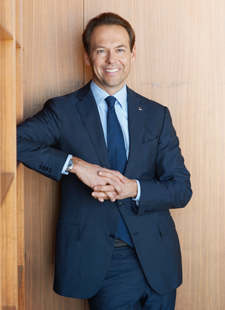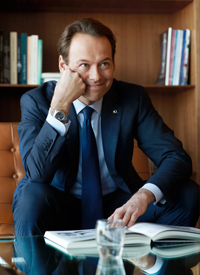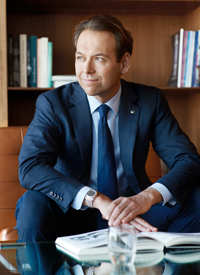UNIQA CEO, Andreas Brandstetter, on the lessons of 2011, UNIQA’s growth strategy and the opportunities that the company sees now.

Andreas Brandstetter
UNIQA CEO
Mr Brandstetter, are you satisfied with 2011?
You would think I was crazy if I said I was happy with 2011, and you would be right – nobody can be satisfied with our results. We had to digest out-of-the-ordinary losses caused by investments in repositioning the UNIQA Group and write-downs of Greek bonds. The investments were planned, but the write-downs weren’t. Every single cent of those annoys me. We put that in the balance sheet because we were able to rely on our robust core business. The bottom line is that that was a major loss, and we will not be able to pay out any dividends for 2011. I’m going to apologise for that to our shareholders at the Annual General Meeting.
So check off 2011 and forget about it?
Check it off, but don’t forget about it! You have to draw the right lessons. Anyone who makes decisions and takes action can make mistakes. That’s how things are. But you shouldn’t make the same mistake twice. We learned from our experience with Greece. We have completely reorganised the manner in which we manage risk. In 2011, we were the first insurer in Austria to put risk management directly under the responsibility of the Management Board, and now we’re implementing the concept of “value-oriented corporate management” throughout the company. It’s important to me that every employee clearly understands that we are managing our customers’ money. So we must be doubly careful, even three or four times as careful.
And what happens next? Will you change your strategy if turbulence gets worse in the financial markets?
In the summer of 2011, we presented a long-term growth strategy for the UNIQA Group. Our goal is to double our number of customers to 15 million by 2020. And we will continue to implement this strategy with determination. I don’t believe in last-minute pushes or constant course corrections. Of course, high one-time effects affected our results, but they freed us up for the future. In 2011, we intentionally invested in repositioning the Group. We are laying the foundations for strong growth. And this will only pay off with hard, consistent work. 2011 sent us a simple message: roll up your sleeves and get down to work! The same applies for 2012.
Why are you currently planning a capital increase of € 500 million? Weren’t you intending to go public in 2013?
We want to exploit the opportunities that are available to us. New options are opening up above all in Central and Eastern Europe: we won over new customers last year – most of them in Eastern Europe. This means that 8.1 million customers are already placing their trust in us. And we want to maintain this tempo. We plan on buying out the minority shareholders who currently hold shares in several of our Eastern European subsidiaries. The market for acquisitions is slowly gaining steam again because global corporations that are not active in Eastern Europe as a core market are selling off their shares. And we want to grow organically and continue to expand our sales network. But to do all this, we now require capital. This is why we have adjusted our time line.*
“We want to exploit the opportunities that present themselves. Last year we won over 600,000 new customers and we want to maintain this tempo.”
Does this mean the re-IPO has been cancelled?
No, on the contrary: our clear goal is to increase our shares in free float significantly. The measures that we’re implementing now make UNIQA shares even more attractive. In addition to the buyout of minority shares in Eastern Europe and our planned growth, we are now creating a clear corporate structure in Austria: we are bundling – pending official approval – personal injury insurance and property insurance into one company that will belong one hundred per cent to UNIQA Holding, a listed company. Going public – or in the new lingo: a re-IPO – is still our goal. I just can’t tell you whether it’s going to be in 2013 or 2014. It depends on when the capital markets allow the transaction to be performed under attractive conditions. We certainly don’t want to squander the shares.*
Why should an investor invest in UNIQA shares?
For four reasons:
-
We have a solid business model with low risk: we are a retail insurer; the majority of our customers are individual people, families and small- to mid-sized businesses.
-
We are powerfully positioned in our domestic markets: we have a stable core business in Austria, and a strong foundation in the growth regions of Central and Eastern Europe. We are closely connected with our local markets and we know them well. In brief: UNIQA is a European local.
-
A UNIQA share is a relatively stable investment: insurers came through all the crises of past decades in better shape than other industries. Our core business is a sustainable investment, not exactly spectacular but also not subject to short-term fluctuations and swings. We are a medium-sized insurer, proper business people. We try to minimise risks and to take advantage, cautiously but with confidence, of growth opportunities.
-
We have a very strong team: we have committed employees and a management team that gets down to work.

You’re talking about security, but the capital markets remain quite sceptical about strong involvement in Eastern Europe ...
That will change again. The markets in Eastern Europe have proven over and over that they are more robust than critics believe. You need only look at how much the region has grown in the last 10 years – despite gloomy predictions.
Does this mean that you’re going to stick to your growth plans for the region?
Yes, of course. We have staying power. Eastern Europe still has enormous potential for growth. The International Monetary Fund, for example, predicts that the countries in Central and Eastern Europe will have much stronger GDP growth than those in Western Europe from 2010 to 2020. The IMF estimates that Austria will have a plus of 28.3 per cent in these 10 years, and for Poland they foresee 52.4 per cent, for Romania 54.1 per cent, and for Albania 84.9 per cent. It was always clear to us that the economic boom in Eastern Europe is a decades-long commercial, economic and societal process. We are in for the long haul. We came to stay, and we came to grow.
“Our commitment in Central and Eastern Europe is for the long term. We came to stay, and we came to grow.”
Still, can you imagine that Uniqa will withdraw from a few markets?
We aren’t soldiers of fortune who gallop into a market and then withdraw as soon as it doesn’t work out. We are not going to leave any market in Central and Eastern Europe where we are currently represented. Yet we are also not going to enter any new countries. We do business wherever we have a solid understanding of people and how they think. As a service provider, UNIQA has to be in the position to develop an understanding of the needs of the people and their society. Only when we know the market through and through can we develop appropriate products. I have spent a great deal of time in Eastern Europe on business. I also like to travel with my family in this region, not least because of the diversity that I’ve come to know there. I can honestly say that I love Eastern Europe! And I believe that you have to have this passion.
You want to double the number of customers to 15 million. Is that even realistic?
Absolutely. When I came to UNIQA in 1997, we had just over one million customers. We multiplied this number more than seven times in the 13 years leading up to 2010. And not just because we are constantly adding new customers in Central and Eastern Europe. We are talking about a market of more than 300 million people. To exploit this potential, we have to be on site locally. This is why we are expanding our presence even further – in Austria too, by the way. After all, this is about an attitude, an inner conviction. We can only win over customers if we really take good care of them. We are therefore concentrating on our core insurance business and our core markets. We allocate our management capacities and our capital to wherever we are at home. This is also why we parted ways with Mannheimer Versicherung in Germany. And this is why we plan to give up the management of our hotel holdings.
What else is on the agenda for 2012? What can shareholders expect this year from UNIQA?
We will do what we promised to our shareholders. We are implementing our four-point programme: we are increasing profitability in Austria. We are developing a new collaborative work model between the Raiffeisen banks and Raiffeisen insurance. We are accelerating growth in CEE. And we are expanding our risk management. Our goal this year is to generate a solid result that beats our profits in 2010. That’s the first step on our way to our target in 2015: by then, we want to have increased our results by up to € 400 million vis-a-vis 2010.

Why should a customer buy UNIQA products?
Our products are more than policies. They are first and foremost services. We are a service provider and our success depends critically on the experiences that our customers have in working with our employees. That is our product, and that gives us an endless amount of work, every day. If the quality of the product is right, then we will win new customers and grow. So we want to improve ourselves constantly. I’d like to thank our 22,000 employees for their commitment and their hard work. They did a fantastic job in 2011, a really difficult year!
What challenges do you anticipate in the insurance industry and for UNIQA?
Our industry has to return once again to its core obligations: providing security and enabling people to stand firmly on their own two feet whilst still being able to keep their head in the clouds. When we talk about children, we often say we want to give them both deep roots and wings. What I want to say with that image is that we offer financial stability, both in terms of old-age provisions and savings. I am committed in my heart to giving people courage and taking away their fears. I think it is our role as an insurer to support and advise our customers. Another challenge is to confront the changing times in an active way. Our customers have new needs, new media are emerging, and this means new opportunities. This is why we have to recognise new trends in a timely manner and constantly ask ourselves how we can anticipate these trends in our services.
One last question: how does UNIQA deal with the topics of sustainability and responsibility?
I don’t believe that what we have achieved as a corporation goes far enough. We have a Green Building Certificate, we have climate protection initiatives, we are involved in social projects – that is all important, but it’s not the kind of sustainability that we are thinking of. This is why last summer we were the first, and still the only, Austrian insurer to make risk and values management the direct responsibility of the Management Board. Our goal is to anchor sustainability as an integral component of our strategy and business model. And in that regard – I say this quite openly – we still have some work to do.
* Editorial amendments based on the ad-hoc notification of 27 April 2012.
